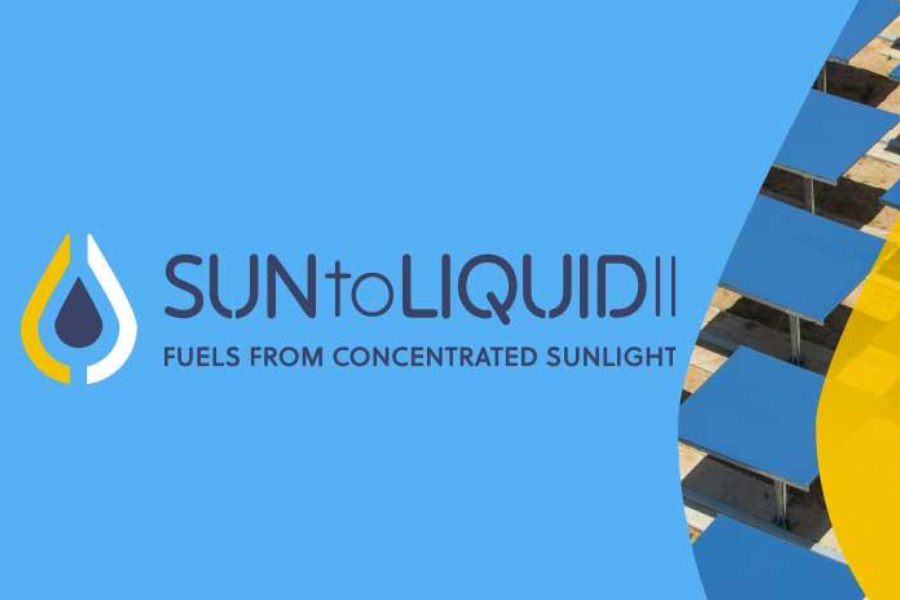Launch of the EU-funded project SUN-to-LIQUID II Fuels from concentrated sunlight
Co-funded by the EU and Switzerland, the European research project SUN-to-LIQUID II was launched on 1 November 2023. Leading partner institutions from academia and industry will demonstrate scalability and high efficiency in the production of sustainable hydrocarbon fuel from water, CO2 and concentrated sunlight via high-temperature chemical conversion.
What is SUN-to-LIQUID II about
The European Commission (EC) aims to eliminate net greenhouse gas (GHG) emissions on the path to climate neutrality by mid-century. The transportation sector will play an important role in the transition to a society living on 100% renewable energy. Two key challenges towards achieving this target relate to (i) an increased feedstock basis for renewable fuel production and (ii) the long-term development of sustainable fuel technologies for aviation.
While electrification, and likely also hydrogen, will play a major role in the decarbonization of transportation, there will still be a continued need for energy-dense liquid hydrocarbon fuels, especially for aviation and shipping. First-generation biofuels cannot meet the required volumes, due to availability and sustainability constraints. Hence, scalable technologies will be required to meet the longer-term fuel demand. Solar radiation is the most scalable form of renewable energy.
SUN-to-LIQUID II will develop a set of versatile technologies for solar fuel production from water and CO2, such as:
- an improved high-flux solar concentration system for applications using high-temperature process heat;
- efficient “solar-thermochemical” fuel production, i.e. a sunlight-driven high-temperature chemical conversion process, using novel 3D-printed materials in the solar reactor for the reduction-oxidation processes;
- heat exchange and recovery concepts to further improve the efficiency of high-temperature conversion processes.
The ultimate output will be a step-change technology advancement and a roadmap for a robust and sustainable conversion pathway to produce high-quality renewable liquid fuel from the inexhaustible potential of solar energy.
The partnership
The SUN-to-LIQUID II consortium consists of six partners from five European countries (Spain, Germany, Switzerland, Netherlands, and France), under the coordination of Bauhaus Luftfahrt e. V. This unique partnership between research institutes and industry aims to bridge the gap between research and industrial applications in high-temperature sunlight-driven chemistry. Leading international research institutes in the field of solar thermochemistry, German Aerospace Center (DLR) and Fundacion IMDEA Energía, collaborate on the improvement of the solar concentrator and the plant operation at the IMDEA Technology Park in Móstoles, Spain. Furthermore, IMDEA tests and implements novel 3D-printed structured redox materials and DLR develops the solar reactor with integrated heat recovery. The industrial partner HyGear BV contributes the conversion of the solar synthesis gas to liquid fuels. The ETH spin-off and industry leader for high-temperature solar chemistry, Synhelion SA, provides the expertise for scaling up the prototype, and performs the exploitation analysis. Bauhaus Luftfahrt e.V. performs techno-economic, environmental, and socio-economic analyses in collaboration with consortium partners. Bauhaus Luftfahrt e.V. is supported by L-up, a French consultancy SME, in project coordination, as well as communication and exploitation activities, thanks to its vast expertise in EU projects.
Key innovations
SUN-to-LIQUID II taps into a virtually unlimited resource of sustainable fuel production by developing the technology and roadmap to produce high-quality renewable liquid fuel directly from water, CO2 and concentrated solar energy. The primary objective of SUN-to- LIQUID II is to increase the solar reactor energy efficiency to more than 15% by improving the effective radiative absorption using 3D-printed redox materials with optimized structure and by recovering sensible heat during the temperature swing redox process. It will bring key advancements from laboratory-scale research in redox material and heat recovery to validation in an industrially relevant environment. Besides, this project will provide evidence for cost-effective >80% GHG emission reduction especially for aviation, with technical scalability to production potentials beyond projected demand. The project is built on the preceding Horizon2020 project SUN-to-LIQUID which successfully demonstrated on-sun solar-thermochemical fuel production on a 50-kW scale.




